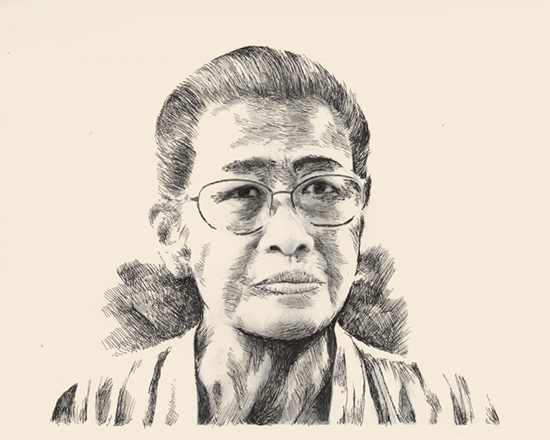Watch ‘11,103’!
On the way to UP there were so many policemen and many rallies. Of course! It was Sept. 21, the anniversary of martial law, which was declared in 1972 exactly 50 years ago. Was there no celebration of what the Marcoses called “The Golden Age” for the Philippines? Instead the current president, Bongbong Romualdez Marcos, was in New York addressing the United Nations.
And us? We were going to watch a martial law documentary titled 11,103. In 2013, our government, headed by President Benigno Aquino, Jr., passed a landmark law that recognized the victims of martial law and ruled that they should be paid from the illegally acquired wealth of Ferdinand and Imelda Marcos. They had stashed this wealth in a Swiss bank account and the Swiss had surrendered some of it to the Philippines. This law was passed during the rule of President Noynoy Aquino. Let’s take a short pause and contemplate the nicknames of our two presidents, sons of two presidents – Noynoy and Bongbong. Can’t we be more serious than this? (Asks the serious writer nicknamed “Twee.”)
It was a beautiful documentary. Everyone should see it so they know from testimonies of real victims what really happened during martial law. They told their stories. They didn’t even know what they were accused of because while they were locked up in prison and tortured, no formal cases were filed against them. They were not accused of murder, or theft or rape. A doctor, whose clinic was first visited by the military, who took medicine samples and blank prescription pads, was accused of treating a member of the NPA without payment. In her own defense she said, “I don’t ask my patients what they believe in. I just treat whatever is ailing them.” They brought her to jail and kept her locked up for years.
There was a gentleman who was also imprisoned for many years. First his oldest brother, a young lawyer who liked to practice to help others, was shot dead by the military. Then his two other brothers were struck in the head with rifles until they died. His parents were not spared either. His accounts of the torture he received, including putting his head in a toilet bowl, were horrible, distressing. But they were true. Sitting there, I could not help but wonder how another Marcos could have been elected to our country’s highest leadership position. Did we forget the atrocities committed back then?
There was a lady from Mindanao who told of their entire barangay being assaulted by the military. They were separated. The men were put in a mosque. The women and children were sent elsewhere. Then the men were shot for no reason at all. Maybe they were suspected of being communists or the NPA. But that was no reason to shoot them. They showed the inside of the mosque riddled with cracks and bullet holes. They said that at the end of it all they collected the bones of the dead, dug a pit behind the mosque and buried all the bones there. She had not spoken about the atrocities for 40 years.
There is no peace here because there is no justice.
There was a lady who walked around with crutches. They caught her also and tortured her. They hit her feet and set fire to one foot. That’s why she limped. But she picked herself up and started all over again.

Another lady talked about her trauma. Soldiers brought her into a room and raped her, taking turns, defiling all the parts of her body that they could access. It was terrible. But she had the courage to discuss it. And they all survived the worst atrocities. I sat in awe of them, overflowing with admiration for their courage to remember, to record, to make this film.
For me, the most moving part came after the film when they were put onstage and were asked questions. Only two of the many survivors interviewed were at the UP Film Center. The man whose brothers were killed and he was imprisoned and the woman from Mindanao. They were both outstandingly brave. I was moved by his responses and his most memorable statement. He said, “There is no peace here because there is no justice.”
For me, he described martial law best. It was a time when there was no justice all over the Philippines.
* * *
Then we saw President Ferdinand “Bongbong” Marcos, Jr., address the United Nations in New York. He spoke to a house full of empty chairs except the few filled by his cohorts.
I read people’s comments, some jubilant, some embarrassed. I was personally grateful that the world took a stand against what happened in the Philippines. Out there are millions of people who empathize with us and who show it most eloquently with their absence.


